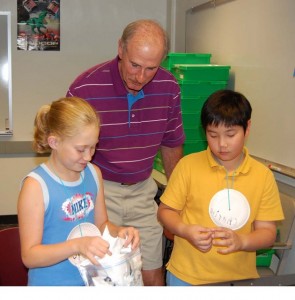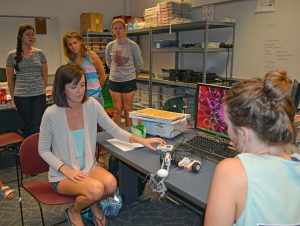
The Toying With TechnologySM (TWT) Program in the College of Engineering at ISU brings engineering education to future K-12 teachers. Larry Genalo (University Professor, Fellow of the American Society for Engineering Education, and associate chair in the MSE Department) shares some history on the program and future plans for TWT.
Recently, the State of Iowa was one of 26 “Lead States” in the development of the Next Generation Science Standards (NGSS). These standards are designed to guide the teaching and learning of K-12 science, and for the first time, they will incorporate engineering alongside science. The Iowa State Board of Education officially adopted these standards on August 6, 2015, but Iowa State’s College of Engineering was ahead of its time when University Professors Larry Genalo (MSE) and Charlie Wright (formerly ECpE, now deceased) created the Toying With TechnologySM program in 1996 with the aid of a grant in the first year of the Miller Faculty Fellowships.
The program includes a class for pre-service teachers (current education majors, almost all of them at the elementary level), a graduate class offered occasionally in the summer for in-service teachers and an extensive K-12 outreach program that is integrated with the course offering. There are currently two sections of 30 pre-service teachers per semester, so the program reaches 120 future teachers per year whose work will ripple through the 25-30 elementary students they will each teach during a school year.
An engaging learning environment
The undergraduate class, Mat E 370 (cross-listed as Cpr E 370) and also called Toying With TechnologySM, features a project-based classroom and practical teaching experiences for the students. For one month of the semester, pre-service teachers go into a local elementary school’s classrooms during the school day to apply the engineering knowledge they have gained through developing and delivering lessons aligned with the NGSS to the elementary children.
Our classroom in Howe Hall is unlike any other engineering classroom since it contains the materials needed for simulated engineering projects that elementary teachers will be able to afford in their future classrooms. For example, students design and build robotic systems out of LEGOs to solve a simulated engineering problem. They design and build boats made of Styrofoam, Popsicle sticks, rubber bands, etc. and have to calculate the “payload” the boat can hold before sinking. Needless to say, testing day around a large tub of water is raucous.
A semester-long project has the pre-service teachers develop an engineering unit lesson plan, which is a series of five lessons they would deliver to their imagined future students. The students align their lessons with the NGSS, just like practicing teachers. These future elementary teachers will be the STEM (science, technology, engineering, and math) leaders in their schools.

Working toward a STEM endorsement
In elementary education, students can add endorsements or minors to their program, which allows them to specialize and teach up to eighth grade in a chosen endorsement area. At ISU, there currently are separate endorsements in math or science and a technology minor. The College of Engineering, represented by Larry Genalo and Benjamin Ahn, assistant professor in AerE, are helping to formulate a STEM endorsement, which will synthesize the four areas much like we try to synthesize those areas in an undergraduate engineering degree. Not only will this STEM endorsement help our pre-service elementary students to better integrate engineering, but it will probably mean a new engineering course with a design emphasis in addition to the existing TWT course.
The country needs more people in STEM fields, especially engineering, and research shows the way to improve the pipeline is to get them interested while they are in elementary school so they make the right choices for their future when in middle and high school.